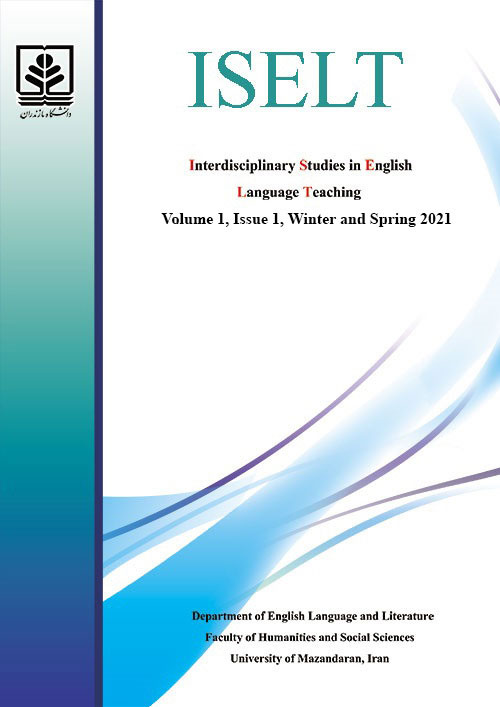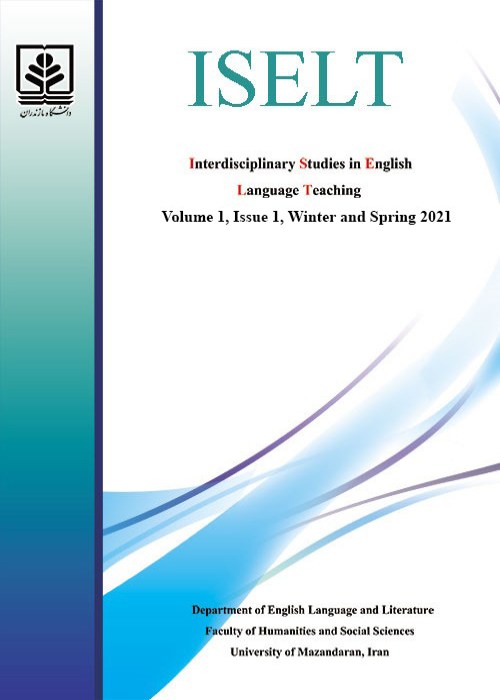فهرست مطالب

Interdisciplinary Studies in English Language Teaching
Volume:1 Issue: 2, Jul 2022
- تاریخ انتشار: 1401/05/03
- تعداد عناوین: 8
-
Pages 7-27Over the past few decades, research in language learning and teaching has highlighted the role of teachers’ perceptions about English language teaching and learning in educational administration and materials planning. Recently, there has been a reform in Iranian high school English textbooks, developing new series of course books called “Prospect” and “Vision”. Hence, the need for exploring teachers’ perceptions about these newly-published textbooks is felt. Thus, the present study aims to investigate teachers’ perceptions about these textbooks (Vision series) in Iranian high schools to understand both challenges and difficulties associated with this change and opportunities and advantages of the changed textbooks for teachers teaching them. To this end, a textbook evaluation questionnaire was generated based on the guidelines of Richards (2001) and distributed among 56 high school teachers. Then from the pool of the participants, ten experienced and novice teachers attended the interview. SPSS software was used to analyze the questionnaire data and the interview data was analyzed using content analysis. The findings revealed that the majority of the participating teachers approved the curriculum innovation and reform. However, they stated that the experts who were involved in materials development seemed to have ignored teachers’ perceptions about the necessity of this reform and their readiness for it. This study, thus, has clear implications that teachers’ perspective can be included in curriculum innovation to improve the quality of the educational system.Keywords: Teachers’ beliefs, newly-published textbooks, textbook evaluation, curriculum innovation
-
Pages 29-51
English phrasal verbs, despite their frequency and indispensability, are notoriously known to be daunting for both EFL learners and teachers. Numerous researchers have tried to resolve this conundrum; however, a definite solution to the dilemma of input type in teaching them is yet to emerge. To address the issue, this mixed-methods study investigated the instructional potential of video input in two forms of monologues and sitcoms in teaching phrasal verbs. A test of phrasal verbs with two parallel versions was custom-made, validated, and employed as the pre-test and post-test. In the quantitative phase, 82 teenage English learners in one control group and two experimental groups were accordingly exposed to textual and video input for eight weeks after taking a proficiency test and the pre-test. Upon the post-test, the results of ANCOVA revealed that the monologue group enjoyed a significantly higher gain during the treatment period, regardless of the proficiency level. For the qualitative phase, an attitude study was conducted via focus group interviews and teacher’s diary. The thematic analysis of the qualitative data indicated a more welcoming attitude towards sitcoms due to a reportedly higher motivational effect. In general, the results confirm the practicality, applicability, and efficiency of video materials in teaching phrasal verbs. It is also concluded that although the entertaining aspects of tasks can lubricate their integration into classroom activities, other contributing factors including instructional value and active attention to the form must not be underestimated in the instruction of phrasal verbs.
Keywords: Teaching phrasal verbs, vocabulary, input modalities, Monologue, sitcom -
Pages 53-73Discourse, as an object being studied nowadays in many disciplines of humanities and social sciences, plays a special role in applied linguistics, in both theory and practice. It is characterized mainly by cohesion and coherence; the former is created by some cohesive devices while the latter is established using certain strategies rarely incorporated into and investigated in language skills development. Therefore, this study is concerned with investigating the effect of discourse coherence strategies incorporated into writing instruction on developing writing skills. To this end, 50 Iranian female EFL learners assigned in 5 groups (4 experimental, 1 control) were exposed to four coherence-based strategies, including 1) Given/New Strategy (GNS), 2) Direct Matching Strategy (DMS), 3) Bridging Strategy (BRS), 4) Reinstating Old Information Strategy (ROIS), 5) Control group conventional instructions of writing skills, respectively. Results of the One-Way ANOVA statistical analysis revealed that using discourse coherence-based strategies in the classroom, compared to mainstream instruction, can more significantly enhance the writing ability of EFL learners. Comparatively, the Give and New strategy-based instruction proved to be most effective in developing the target skill. However, cross-strategically, no significant difference was seen among the investigated discourse coherence-based strategies. The findings offer pedagogical implications for L2 practitioners, teachers, materials developers, and autonomy-seeking learners. They also provide further research insights into teaching writing besides all other language skills.Keywords: Discourse, Coherence Strategies, Writing Discourse, Discourse Instruction
-
Pages 75-99Teaching English as a foreign language (EFL) to young learners is gaining increasing significance given many parents’ interest in EFL learning by their pre-school children. In this micro-ethnographic study, in light of a long-held debate in literacy education, we examine the nature of the little-explored current practices of EFL teaching to young learners from the two instructional perspectives of Phonics (PH) and Whole Language (WL). Data collection was carried out through micro-ethnographic observation of an EFL teacher training course for teachers of young learners as well as four classes at a private language institute in Tehran over a period of three months. Data bodies, including audio-recordings, fieldnotes, reflective memos, teaching materials, and young learners’ writings were analyzed based on a grounded theory perspective. The findings illustrate detailed accounts of teaching and learning involvements in this context and indicate that the instructional practices labeled as PH-based teaching are in fact an uneven mix of PH and WL. On this basis, we argue that a conscious and coherent combination of perspectives from the two approaches can provide opportunities for more balanced teaching and more meaningful EFL learning experiences. On this basis, we argue that a conscious and coherent combination of perspectives from the two approaches can provide opportunities for more balanced teaching and more meaningful EFL learning experiences.Keywords: EFL teaching, young EFL learners, foreign language literacy, Phonics, Whole Language
-
Pages 101-112EFL teachers’ Continuing Professional Development (CPD) has always been of much concern to all applied linguists and EFL teachers. The present study investigates Iranian ESP/EAP teachers' kinds of CPD activities. To this end, a mixed-methods research design has been applied. In the first phase, a phenomenological research method was used. Seventeen participants were interviewed, and the main CPD activities were extracted through content analysis of the interviews. The participants argued that they developed their profession through teaching (work), continuing their education, attending CPD events such as conferences and workshops, presenting their works in CPD events, and self-study activities such as reading journals, books, and watching films and movies, etc. In the second phase, a researcher-developed instrument was administered to 60 male and female ESP teachers who were selected through convenience sampling among all those who taught ESP at the State and Azad Universities in Tehran. The data were collected and analyzed through descriptive and inferential statistics. The results showed that male and female teachers do some common CPD activities. However, male and female teachers are different in terms of some other CPD activities. The findings have several implications for administrators, higher education institutes, teacher trainers, and teachers of the other majors.Keywords: Professional Development, Continuing Professional Development, ESP, EAP, ESP teachers
-
Pages 113-128The purpose of this study was to investigate the effect of Genre-Based Instruction (GBI) on Iranian Translation students’ translation ability. In this study, 60 students of intermediate level were selected randomly and assigned to two groups, experimental and control groups. The pre-tests of translation were administered to both groups. The test was designed to afford a potential measure of learners’ translation quality. While the participants in the experimental group were trained to translate through genre-based translation, the participants in the control group received translation instruction just through mainstream translation activities. After providing the specific instructions, both groups received a translation post-test. The results of test scores, rated by two raters, were compared to ascertain the effective instructional treatment. Upon reviewing the results of the paired samples t-tests, it was revealed that both types of instruction were significantly effective in improving the Iranian translation learners’ translation ability. However, the results of the independent samples t-test showed that the experimental group significantly outperformed the control group after the intervention, indicating that using the GBI was quite successful in enhancing the students’ translation quality. The findings of this study offer some theoretical and pedagogical implications for teachers, translator educators, curriculum and material developers, and policymakers in an EFL context.Keywords: Genre, Genre-Based Instruction (GBI), Translation, Translation ability
-
Pages 129-148The present study aimed at comparing the perceptions of two groups of Iranian EFL teachers’- novice vs. experienced- of their Professional Development (PD) regarding teaching grammar. Ten EFL teachers were selected as novice teachers with less than five years of teaching experience and ten teachers were selected as experienced teachers with more than twenty years of teaching experience. A structured interview was applied to determine and compare the novice and experienced teachers’ attitudes toward PD based on the issue of teaching grammar. Content analysis was used to analyze the collected data. The results indicated that most novice teachers believed that their views concerning teaching grammar have changed as they became more experienced. They mentioned some examples of such changes in their teaching practice such as using L1 when necessary, taking several English classes to enhance their experience, reading different books, learning from more experienced teachers, revising errors with the help of knowledgeable teachers, etc. Based on the ideas of the experienced teachers, adhering to a fixed old method cannot answer the complexity of teaching to different learners at different points of time. Therefore, most of them mentioned that through reflection on their teaching practice and reading articles, and consulting other teachers, they try to keep up-to-date. The study presented a number of implications for language teachers and curriculum designers on the issue of PD.Keywords: attitudes, Experienced teachers, Novice teachers, Professional Development (PD)
-
Pages 149-163Given that teachers’ academic qualification exerts significant effects upon their cognitive- behavioral conduct, especially in the teaching context, which, in turn, has an undeniable and crucial role in their learners’ performance, the present study aimed at investigating the differences between In-Field-Teaching (IFT) EFL teachers and their Out-of-Field Teaching (OFT) counterparts with regard to their Classroom Management (CM) strategies and Teachers’ Self-Efficacy (TSE) beliefs and their students’ achievement. To this end, 60 (30 IFT and 30 OFT) EFL teachers from three different cities in Iran were conveniently selected, and a random sample of 64 EFL learners were picked from the students of both groups of teachers. Two questionnaires, namely, CM Techniques Scale and Teacher Efficacy Scale were used to gather data on CM and TSE, respectively. Moreover, an adapted version of the first certificate in English test was used to assess students’ achievement before and after the instruction. Results revealed that the IFT EFL teachers majorly used positive CM strategies compared to the OFT EFL teachers who mainly used negative CM strategies. Further comparisons, moreover, showed that the IFT EFL teachers had a significantly higher sense of self-efficacy than their counterparts. Additionally, statistical tests indicated that the IFT EFL teachers had a better performance in comparison to the OFT-EFL teachers. Implications of these findings for quality education and quality teaching are discussed in terms of providing subject-specific skills and training programs, specifically for the OFT teachers.Keywords: Classroom Management (CM), In-Field Teaching (IFT), Out-of-Field Teaching (OFT), Teachers’ Self-Efficacy (TSE)


